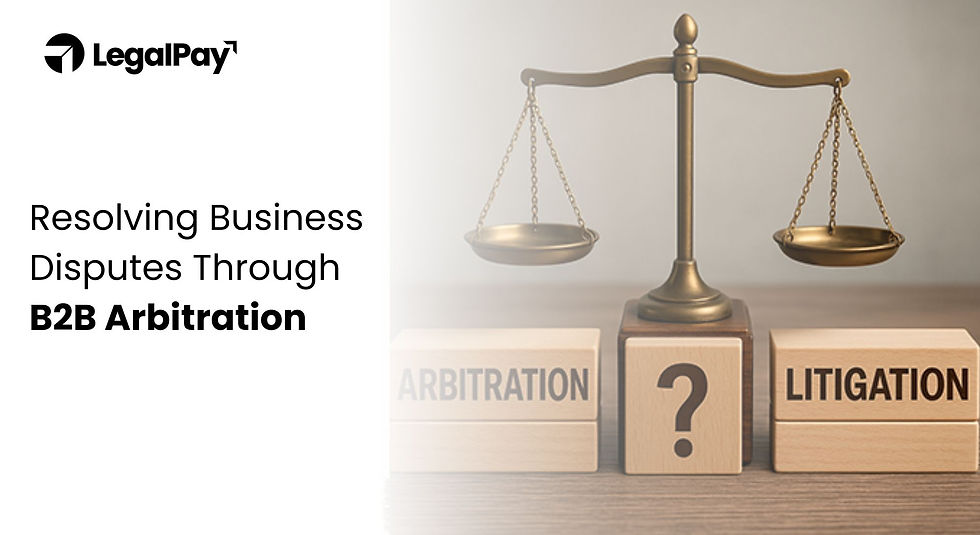Commercial Wisdom of Committee of Creditors
- LegalPay

- Dec 29, 2022
- 4 min read

In a recent judgment authored by Hon’ble Justice B.R. Gavai and Hon’ble Justice Ms. Kohli in the matter of Vallal RCK v. M/s Siva Industries and Holdings Limited and Ors, the Court has reiterated that the wisdom of the committee of creditors is of paramount status and does not need any judicial intervention.
Factual Background
IDBI bank Limited filed an application under section 7 of the IBC for initiation of the Corporate Insolvency Resolution Process (CIRP) against the corporate debtor. The application was admitted by the Adjudicating Authority and CIRP was initiated against the corporate debtor. The RP had presented the resolution plan before the Committee of Creditors (CoC), which did not receive the required 66% of votes, hence the plan was not approved. Pursuant thereto, the Resolution Professional (RP) applied to the adjudicating authority for the initiation of the liquidation process of the Corporate Debtor.
The promoter of the corporate debtor filed a one-time settlement application before National Company Law Tribunal (NCLT), and the said settlement plan after the due deliberations received a majority vote of 94.23%. The RP filed the application before the NCLT for the withdrawal of CIRP initiated against the corporate debtor as the plan received a majority vote of 94.23%. The NCLT held that “the said settlement plan was not a settlement simpliciter under section 12A of the IBC but a “Business Restructuring Plan” and thus rejected the application for withdrawal of CIRP and approval of the settlement Plan.” Also, the NCLT initiated the Liquidation proceedings against the Corporate Debtor.
The appellant filed the appeal against the order of NCLT and the same was dismissed by the National Company Law Appellate Tribunal (NCLAT). The appellant filed the appeal before Supreme Court (SC) against the judgment of the NCLAT.
Issue
In the present case, the main issue dealt with by the Hon’ble Supreme Court is whether the NCLT i.e Adjudicating Authority, or the NCLAT i.e. Appellate Authority can sit in an appeal over the commercial wisdom of the Committee of Creditors or not i.e. when 90% and more of the creditors, in their wisdom after due deliberation, find that it will be in the interest of all the stakeholders to permit settlement and withdraw CIRP, then can the adjudicating authority or the appellate authority sit in an appeal over the commercial wisdom of the CoC.
Contentions of the Counsel
The counsel for the appellant contended that “it is more than well settled that the adjudicating authority or the appellate authority cannot sit in an appeal over the commercial wisdom of CoC. He submitted that one of the primary objectives of IBC is to pay the dues of the creditors to the maximum.
The decision of the Supreme Court
The SC while delivering its judgment referred to the Statement of Objects and Reasons for the IBC, Second Amendment Act, 2018. The SC noted that the provision pertaining to withdrawal of the Application are more stringent in nature as a voting share of 75% of CoC for approval of the Resolution Plan was brought down to 66% and Section 12A of the IBC which was brought by the same amendment, requires the voting share of 90% of CoC for approval of withdrawal of CIRP. The SC held that the commercial wisdom the of CoC has been given paramount status without any judicial intervention. The interference would be warranted only when the adjudicating authority or the appellate authority finds the decision of the CoC to be completely arbitrary, and irrational. The Supreme Court allowed the appeals and the application filed for withdrawal of CIRP.
Conclusion
The CoC plays a significant role in the Corporate insolvency resolution process. The CoC is an important institution under the code as it represents the interests of the Creditors.
The CoC is a group of creditors appointed to look after the process. The main function of the committee of creditors is to make certain important decisions pertaining to the insolvency resolution process, which includes the appointment of RP, approval of the resolution plan, and voting on matters related to the Insolvency resolution process.
The SC has consistently held in its own judgments that the commercial wisdom of the CoC has been given paramount status without any judicial intervention. In the present case, the SC noted that there is an inherent assumption that the Financial Creditors are well-informed about the condition of the corporate debtor and the practical aspects of the proposed resolution plan. They take decisions after completely scrutinizing the proposed resolution plan and assessment made by their team of experts.
So, in the present case, the SC has balanced the power of the CoC and the Adjudicating Authority or the Appellate Authority. On one hand, SC said that the Adjudicating Authority or the appellate authority cannot sit in an appeal over the commercial wisdom of CoC and on the other hand it held that the Adjudicating Authority or the Appellate Authority can interfere only when the Adjudicating Authority or the Appellate Authority finds the decision of CoC to be wholly arbitrary and irrational. By this landmark decision, the SC has outlined the limits of the CoC and the Adjudicating Authority or the Appellate Authority.




Comments